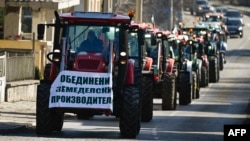The European Commission and Kyiv have struck a preliminary deal that should allow more Ukrainian agricultural exports into the European Union.
The agreement represents a compromise between two trade regimes.
One of them is the total trade liberalization known as the Autonomous Trade Measures (ATMs), which Brussels granted Ukraine after Russia's full-scale invasion in 2022. The other is the regular free-trade tariff system that came back into force on June 5 after the ATMs expired.
That regular tariff system -- part of the EU-Ukraine association agreement in place since 2016 -- hasn't been as lucrative for Ukraine as the temporary ATMs were.
Kyiv has argued that reverting fully to the association agreement could cost the country €3 billion ($3.4 billion) annually and potentially reduce its gross domestic product by 1 percent unless more preferential terms are offered.
The fine details of the preliminary deal stuck on June 30 between Kyiv and Brussels still need to be ironed out and not all numbers have been published yet, so it is hard to calculate how much better it is for the Ukrainian agricultural sector.
'Frontline' States
What is totally obvious, however, is that Brussels negotiated the new document with EU farmers in mind -- notably those in so-called frontline states near Ukraine, such as Bulgaria, Hungary, Poland, Romania, and Slovakia.
Farmers in these countries at various times in 2023 and 2024 blocked the borders with Ukraine in protest, arguing that cheaper Ukrainian agricultural products were flooding local markets and creating unfair competition.
In response to the protests, the European Commission introduced safeguard measures to limit imports of certain products once they reached specific thresholds -- a brake that has been pulled numerous times recently.
Safeguard measures will also be part of the new agreement -- and, under the revised rules, individual EU member states can now raise concerns about national trade irregularities. The previous agreement required them to act as a regional group.
Another key demand from the frontline member states that the commission has also accepted is that Ukraine gradually align with relevant EU standards on sanitary measures, animal welfare, and the use of pesticides by 2028.
This requirement is linked to Ukraine's bid to join the European Union, as full compliance with EU rules is essential for membership.
The potential problem here is that Ukraine is unlikely to become a member that quickly and the costs of undergoing these changes will ultimately be borne by Ukrainian farmers. In this sense, their products risk becoming more expensive and possibly less attractive on global markets, which is a major source of income for the country.
The EU has pledged to help Ukrainian exporters reach their traditional markets outside Europe, aiming to allow Ukrainian agricultural goods to transit through its territory without ending up on sale locally. However, with no concrete commitments from Brussels so far, it's unclear how this will be achieved.
Concessions For Kyiv
So, what has Ukraine gained from this deal?
For some products that are a sensitive issue for EU farmers -- such as sugar, poultry, eggs, wheat, maize, and honey -- Kyiv has secured larger export quotas than those under the original association agreement. Notably, quotas for eggs, sugar, and honey have increased nearly fivefold, while those for key items like poultry and maize have almost doubled.
Although this doesn't amount to a complete free flow of goods, Ukraine will at least be able to export more to the EU market than it did in 2021. Additionally, Ukraine has secured full free trade on certain products, including mushrooms, grape juice, processed milk products, yogurts, and kefirs.
On the downside for Ukraine, quotas for most meat products -- including beef, pork, and lamb -- remain unchanged from the 2016 association agreement, reflecting another win for EU farmers wary of too much competition in this sector.
A final agreement, due to be presented to EU member states in the coming weeks, will need approval by a qualified majority -- meaning 55 percent of member states representing at least 65 percent of the total EU population. While most in Brussels believe this is achievable, farmers' lobby groups could still pressure some member states to push for a deal more favorable to EU agricultural producers.
Ukraine will be relieved that the association agreement measures currently in place look set to be lifted, but it is clear that these negotiations very much reflect a harder EU stance toward Kyiv.
Negotiations on this deal were put on the backburner during the Hungarian presidency of the Council of the European Union in the latter half of 2024 due to Budapest's reluctance to be seen as helping Ukraine.
Meanwhile, the Polish presidency during the first six months of this year also pushed the European Commission to pause negotiations until after Poland's presidential election on June 1. Both main candidates pledged to protect domestic farmers in their campaigns.










